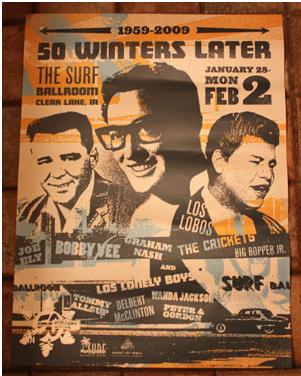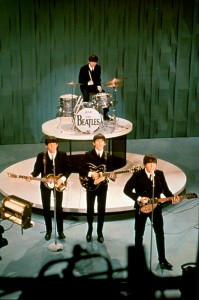They died 55 years ago today — three young men who gained immortality for the music they wrote, played and sang, and for what further heights they might have reached in their careers, if only …
Two Texans, Buddy Holly and J.P. Richardson, a.k.a. The Big Bopper; and a teenage Californian with Mexican roots, Ritchie Valens, were killed instantly in the crash of a small private plane piloted by Roger Peterson, only 21 himself, in a bleak, snow-covered rural field near Clear Lake, Iowa, early on the morning of Feb. 3, 1959. Their Winter Dance Party featuring live shows through the upper Midwest was wobbling after endless problems with a run-down bus, extreme cold, and a copious covering of snow on the frozen Iowa ground.
Holly, Richardson and Valens wanted to get to their next scheduled concert, at Moorhead, Minnesota , more quickly than they could riding in that rickety bus, so they could get some much-needed rest. Peterson agreed to fly them. But the plane went haywire — for reasons still unclear after all these years — shortly after take-off, dipped toward the earth where the right wing struck and carved a crease out of the frozen ground, then crashed in the field some yards farther on, throwing the three musicians through the front of the plane to slam fatally against the ground, and leaving Peterson’s body trapped behind the steering device in the plane.
Waylon Jennings, his “Country Outlaw” fame still years in the future, was one of Holly’s sidemen during the tour, and he had been scheduled to be the third musician in the plane, but after Valens pleaded with him to let the Californian have that seat, they flipped a coin to decide it, and Valens “won.” Holly teased Jennings by saying, “Hope your old bus breaks down!” and Jennings retorted with, “Hope your old plane crashes!” Those five words haunted Jennings for many years.
Holly was the best known of the three victims, with his two-man backing group he called The Crickets. They had had big rock ‘n’ roll/rockabilly hits with such songs as “Peggy Sue,” “Oh Boy,” “That’ll Be the Day,” “Not Fade Away,” and a cover version of Bobby Darin’s “Early in the Morning” which I think is one of the greatest rock singles of all time. He was 22 and had been married for only a few months when he died.
J.P. Richardson, the Big Bopper (as he had nicknamed himself as a disc jockey on radio) was the “old man” of the trio at 28. People still tend to remember his biggest hit, “Chantilly Lace,” in which he sounds like the world’s worst skirt-chaser, but he also had a hit with “Little Red Riding Hood”, and another song he wrote but which was recorded by George Jones, “White Lightnin’,” later in 1959.
Ritchie Valens (real family name: Valenzuela) was a shy 17-year-old who nevertheless had an electrifying stage presence and played a very mean guitar. His singing thrilled the teenage girls, especially, in his hit songs “La Bamba” and “Donna.” The latter one has a special meaning for me; I once sent the sheet music for it to a lovely, brown-haired girl who I had met at the Valley City Saga, part of the Madison Sesquicentennial of 1959, where she and I were both extras in the pageant which was put on every night for a week. Yes, her name was “Donna.” How on earth did you guess?
News of the crash hit the teen world like a hydrogen bomb. I still remember hearing the reports of the tragedy on the radio, and us kids talking about it that day at school. Oddly enough, while I knew of Ritchie Valens from the song “Donna,” and had chortled with delight along with many others at the Big Bopper’s over-the-top performance in “Chantilly Lace,” I had never heard of Buddy Holly until his tragic death. Although I’m sure I’d heard some of his songs on the “Soda Pop Hop,” deejayed by “Jocko” Jack Stockton on WORX radio here in Madison. Just had never picked up on his name. Odd.
Charismatic entertainers who die young — especially in such events as the Clear Lake crash — are ensured of being remembered for many years. Holly, Richardson and Valens were among the leading proofs of that. Pre-eminent among the “memorials” to them was the song written and recorded in 1971 by Don McLean, called “American Pie.” It was in the lyrics of that song that the phrase “The Day the Music Died,” meaning the fatal Feb. 3, 1959 crash, originated. While the names of the three doomed singers are not mentioned in the song, there is no doubt that is who McLean’s talking about. Them, and other prominent people and iconic events of the late-’50s to early-’70s world of rock music. And hard as it may be to believe, it was only recently that I picked up on the line in the song, “This’ll be the day that I die.” Remember “That’ll Be the Day”?
Movies have been made depicting the lives of both Holly and Valens. J.P. Richardson’s son, who is now in his 50s, has performed his father’s music publicly for years. Holly, especially, still has many followers who treasure the records that he made, the old kinescopes which show him performing on American Bandstand, the Arthur Murray Dance Party, and others.
——
There is another famous rock music anniversary coming up, just six days after the tragic one of Feb. 3. This one, however, is joyful: The 50th anniversary of the first live U.S. appearance of the Beatles, on the Ed Sullivan Show, Feb. 9, 1964.
It’s almost eerie how these two anniversaries are so close to one another, albeit five years apart. Because when Britons John Lennon and Paul McCartney first met, and soon began writing, singing and playing music together, one of their biggest inspirations was Buddy Holly. That was in the year 1957, the year Holly and the Crickets first hit it big, streaking through the rock sky like a meteor, although one that would, sadly, burn out suddenly after just two years of fame. The next year, 1958, Lennon, McCartney and George Harrison formed the band which would some day be known as the Beatles, the Fab Four, the greatest rock band of all time. They even got the idea for their name — that of an insect, with the letters changed slightly — from “The Crickets.”
When the Beatles appeared on the Sullivan show, John Lennon was ecstatic upon learning that while doing their act, they were standing on the exact same spot on the theater stage where Holly and the Crickets had been when they appeared on the show, Dec. 1, 1957.
Lennon and McCartney always freely acknowledged their huge debt to Buddy Holly, and a comparable one to the American rock duo the Everly Brothers, who were contemporaries and friends of Holly. When his funeral service was held a few days after the crash, in his hometown in Texas, Phil Everly, the younger of the brothers, acted as a pallbearer. His brother Don has said in later years that he wasn’t even able to attend the services, but went home and took to his bed because he was so distraught at Holly’s death.
In another stunning coincidence, a few days after the start of 2014, Phil Everly died — just a month before the two rock anniversaries. Maybe the planets were aligned just right. Or maybe it was what some of us call a “God wink.”
The Beatles broke up in 1970, of course, due to creative differences and just plain weariness over being in the world’s spotlight 24/7. They went their separate ways. John Lennon was killed by a madman in 1980; George Harrison died of lung cancer in 2001.
But Paul and Ringo have continued on, right up to the present day. Each still tours with his own band. They appeared together last Sunday at the Grammy Awards. On Feb. 9 there’ll be a huge TV tribute to the Fab Four, the Loveable Moptops, to honor them on their 50th anniversary.
And Paul hasn’t forgotten what he and John and George and Ringo owed to Buddy Holly. In 1976, McCartney purchased Holly’s entire music catalogue. On what would have been Holly’s 40th birthday that same year, a week-long tribute to the songster from Lubbock, Texas, who was extremely popular in Britain, was held. It was organized by Paul McCartney. “Buddy Holly Week” has become an annual event in Britain in the years since; McCartney has been its guiding spirit.
Who knows what young Briton might be inspired by those exposures to “Peggy Sue” and “Oh, Boy” and “Not Fade Away” — and “Early in the Morning”? Perhaps there is another Buddy Holly, or Ritchie Valens, or J.P. Richardson, in those audiences. He — or she — just needs to be discovered.
Because you see, 55 years ago today, Buddy, Ritchie and J.P. died — but their music lives on.




1 comment for “‘The Day the Music Died’ — but it lives on”